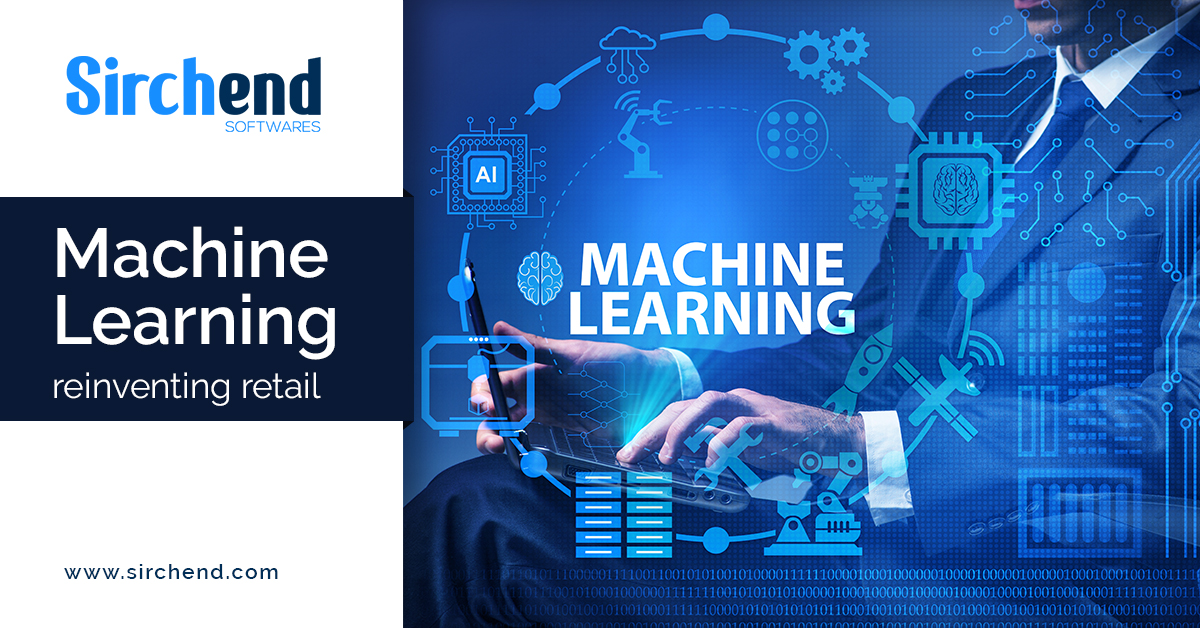Machine Learning boosts sales and customer engagement through personalized recommendations, streamlined supply and optimized pricing. There’s more to how Machine Learning reinvents the retail industry.
With Machine Learning, the retail domain is able to play a significant role in the entire supply chain. In 2017, global retail sales accounted for $22.97 trillion. In the upcoming years, it is anticipated to hit above $29 trillion. And numerous factors are present to affect these changes. One of them is the contribution of Machine Learning integration.
Besides ML, digital startups are using emerging technologies like Deep Learning, Internet of Things, Artificial Intelligence, etc. However, Machine Learning uses plenty of learning algorithms in order to recognize patterns and render insights from data.
Moreover, it has the potential to conduct future prediction with the help of the insights gauged from data. Retailers, now, can take customer experience to a totally different and new dimension.
Ways on how Machine Learning Reinvents the Retail Industry
Technologies of the modern-day like IoT, AI, Blockchain, etc. are assisting retailers to accumulate enormous data. However, it remains useless if they cannot extract useful insights from it. This is where ML enters with its helping hand.
Machine Learning algorithms generate tangible insights from data that retailers can use.
- Personalizing product recommendations
When customers receive personalized product recommendations, the practice appeals to them. Machine Learning extracts insights from data history and customer behaviours in the past.
Also, the retailers benefit more with ML thanks to the best recommendations that come up before the customers. Also, this is an incredible way to conduct remarketing after the customers bounce away from a particular e-commerce app.
Machine Learning algorithms have the potential to create diverse correlations among the items and customers to deliver product recommendations. This way, Machine Learning reinvents the retail industry.
In this way, ML algorithms assist in providing precise recommendations to customers and present them across different relevant products that they might not have encountered otherwise.
- Predicting customer behaviour
Through predicting customers’ behaviour with the assistance of Machine Learning, sales representatives tend to heighten business sales. The algorithms can anticipate the kind of customers and how long will they take to buy an item when they are trained with the history of the customers’ purchase data.
Furthermore, ML also predicts the number of item variation that a customer will sort through prior to purchasing the item.
- Optimizing price
The pricing is one of the major contributing factors in the retail industry, of course. When customers witness that a similar product is found elsewhere at a more reasonable price, the sale for the former retail business cancels and bounces off.
Now, the pricing is determined on the basis of weather, local demand, competition, etc. ML algorithms tend to consistently monitor the web content in order to accumulate information regarding the competitor’s pricing.
Moreover, the algorithms have the capability to recognize the best and promotional prices of products. Also, it administers the local demand for any item. And if the supply runs low and demand is high, then retailers can boost the price in order to gain maximum revenue from that particular product.
- Optimizing inventory
Tackling the inventory is a constant challenge for the retail industry. Now, this is challenging since it includes administering diverse uncertain aspects. For example, it encompasses the act of monitoring purchase behaviour, changing prices, changing climate, etc.
Also, Machine Learning reinvents the retail industry in predicting the upcoming climate changes and the outcomes that it will fetch in the context of the retail industry. For example, ML has the ability to identify the degree of carbon gases present in the environment. Also, it can actively monitor the alterations in the ecosystem.
- Preventing theft
Let’s face it: shoplifting is common. And this has incurred huge loses to the retail companies. Goods around $13 billion are stolen from the physical shops every year. But, Machine Learning algorithms are efficient in providing real-time aid to retailers who experience theft unknowingly.
Machine Learning algorithms help bring up the image of the shoplifters on the vision system of the computer. This way, retailers can easily spot them right at the moment of their entry into the shop. All this information is delivered to the retailer just when the shoplifter enters the shop.
Machine Learning reinvents the retail industry in a strategic manner. These are the ways in which they contribute to the rapid growth of the business. This way, ML can be coupled with other technologies and retailers easily achieve unparalleled breakthroughs in the retail domain.




























